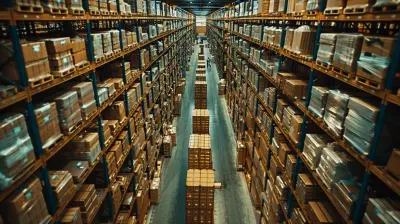Sustainable Operations: Going Green Without Compromising Efficiency
16 November 2025
Let’s be real—going green sounds great on paper, but when it comes to actually making changes in your business, it can feel like walking a tightrope. You want to be eco-friendly, yes, but you can’t exactly afford to slow down operations, dip into your profits, or throw productivity out the window. Sound familiar?
Well, here’s the good news: sustainable operations and business efficiency aren’t mutually exclusive. In fact, when done right, they go hand in hand like peanut butter and jelly. Welcome to the modern way of doing business—smarter, leaner, and greener.
In this post, we're diving deep into how your business can embrace sustainability without losing its edge. We’ll cover practical strategies, real benefits (beyond saving the planet), and how you can start making smart, green moves today.
Why Sustainability Matters—More Than Ever
It’s not just about being trendy or scoring PR points. Sustainability has quickly become a must-have, not a nice-to-have. Consumers are demanding it. Employees care about it. Regulations are tightening. And let’s not forget—our planet desperately needs it.But here's the kicker—businesses that invest in sustainable practices often outperform their competitors in the long run. It’s no longer just a moral choice; it’s a smart business move.
Debunking the Myth: Green = Slow or Expensive
One of the biggest reasons businesses hesitate? The myth that sustainability is costly or slows things down.Think about it like this—yes, some green initiatives require upfront investment, kind of like switching from paper maps to GPS back in the day. But once you’re set up, you’re cruising, saving time, money, and resources along the way.
Let’s break it down.
- Energy efficiency can slash your utility bills.
- Waste reduction lowers disposal costs.
- Eco-friendly packaging can boost customer satisfaction and brand image.
- Sustainable sourcing can strengthen supplier relationships and reduce risk.
So instead of thinking of it as a cost, frame it as an investment in future-proofing your business.
Key Areas to Focus On for Sustainable Operations
Okay, let’s get into the nitty-gritty. Sustainability isn’t one-size-fits-all, but these core areas are where most businesses can start making real impact.1. Energy Efficiency: Bright Ideas That Save Watts (and Wallets)
Let’s start with the obvious—energy. Reducing energy usage is one of the lowest-hanging fruits in business sustainability.Quick Wins:
- Switch to LED lighting. Less heat, less energy, longer lifespan.- Install motion sensors in low-traffic areas.
- Turn off unused equipment at night and on weekends.
- Upgrade to energy-efficient appliances and machinery.
Bigger Moves:
- Use smart building management systems.- Generate your own power with solar panels (if you’ve got the roof space).
- Invest in electric or hybrid company vehicles.
Small actions here lead to big savings—both financially and environmentally.
2. Supply Chain Sustainability: Greening from the Ground Up
You’re only as green as your vendors, right? A sustainable supply chain means making sure every link in the chain aligns with your environmental goals.What To Do:
- Choose suppliers with ethical and eco-friendly practices.- Use local vendors to reduce transportation emissions.
- Work with partners who minimize waste and use recyclable packaging.
- Regularly audit your supply chain for sustainability compliance.
This isn’t just good PR—it’s good risk management. Sustainable suppliers typically have more resilient systems, which can help avoid disruptions.
3. Waste Management: Less Trash, More Cash
Waste is more than just garbage—it’s money flying out the window. Cutting down on waste is easier than you think and hits the sweet spot of saving cash while showing you care.Game Plan:
- Launch a recycling program for paper, plastics, and electronics.- Digitize documents to reduce paper use.
- Compost food waste in cafeterias or kitchens.
- Use inventory management software to reduce overstock and spoilage.
Even better? Employees often get behind waste reduction initiatives because they’re easy, visible, and instantly rewarding.
4. Water Conservation: Every Drop Counts
Water’s one of those sneaky resource-drainers that often gets overlooked. But saving water doesn’t just help the planet—it lowers your utility bill and can even extend the life of your equipment.Try This:
- Install low-flow faucets and toilets.- Fix leaks ASAP (you’d be shocked how much is wasted from one dripping pipe).
- Reuse water where it makes sense—like for landscaping or cooling.
It’s about being mindful and intentional. And hey, customers love seeing businesses act responsibly with natural resources.
5. Employee Engagement: Your Green Champions
Here’s a fun fact—your employees are your biggest allies in becoming more sustainable. If they care about the environment in their personal lives, they’ll likely want to carry that passion into their work. All you need to do is tap into it.How To Engage:
- Launch a green team or committee.- Offer eco-friendly perks (e.g., bike-to-work incentives, reusable water bottles).
- Encourage remote work or carpooling to reduce emissions.
- Recognize and reward sustainable ideas and results.
When your team’s invested, sustainability becomes part of your company culture. And that’s where the magic happens.
Sustainable Tech: The Digital Advantage
Technology is a game-changer for green operations. With the right tools, you can streamline processes, cut waste, and track your progress—all without lifting a shovel.Must-Have Tools:
- Cloud computing (reduces need for energy-hungry servers).- IoT (Internet of Things) devices that monitor energy usage in real time.
- Project management software to reduce travel and meetings.
- AI-driven data analysis to optimize resource allocation.
Think of this as putting your business on autopilot for efficiency and sustainability. It's a win-win.
Measuring Success: KPIs for Sustainability
You can’t improve what you don’t measure. So how do you know if your sustainability efforts are working?Here are some key performance indicators (KPIs) that matter:
- Total energy consumption (monthly/quarterly)
- Waste diversion rate (how much waste is recycled or reused)
- Carbon footprint (especially for logistics-heavy businesses)
- Water usage per department or facility
- Supplier sustainability scorecards
- Employee participation in eco-initiatives
Set benchmarks, track progress, and celebrate your wins. Progress isn’t always instant, but it is measurable.
Balancing Act: Sustainability Without Slowing Down
Now, let’s circle back to where we started. Can you be green and fast? Absolutely. You don’t need to overhaul everything overnight. Instead, think of sustainability as a journey—one that can (and should) enhance the way you do business.Tips to Find That Balance:
- Start small, then scale.- Look for quick wins that also bring long-term gains.
- Involve your team early and often.
- Use data to drive decisions, not emotions.
- Stay flexible and adapt as you learn.
Efficiency doesn’t have to mean cutting corners. In fact, sustainable improvements often reveal inefficiencies you didn’t even know existed—meaning you’re not just greener, you’re leaner.
Real World Wins: Brands Doing It Right
Need a little inspiration? Check out these companies proving that sustainable operations and peak performance can go hand in hand:- Patagonia: Their commitment to environmental sustainability hasn’t stopped them from becoming a billion-dollar brand. In fact, it’s part of what makes them successful.
- IKEA: They've invested heavily in renewable energy and aim to become climate positive by 2030—without slowing their global expansion.
- Unilever: Over 60% of their growth comes from brands that are purpose-driven and focused on sustainability.
No matter your size or industry, there’s room—and reason—to go green.
Final Thoughts: A Greener Future Starts Today
Here’s the thing: sustainable operations aren’t some far-off goal. They’re a daily choice. A mindset. With the right approach, you can reduce your environmental impact and make your business more agile, resilient, and profitable.So what’s stopping you?
Start small. Think big. And remember—you don’t need to save the world in one day. You just need to start heading in the right direction.
all images in this post were generated using AI tools
Category:
Operations ManagementAuthor:

Lily Pacheco
Discussion
rate this article
1 comments
Samira Adkins
Who knew saving the planet could be so efficient? It’s like getting a green thumb while juggling!
November 18, 2025 at 3:55 AM

Lily Pacheco
Absolutely! Embracing sustainable practices can lead to innovative solutions that enhance both environmental and operational efficiency. It’s all about balance!


